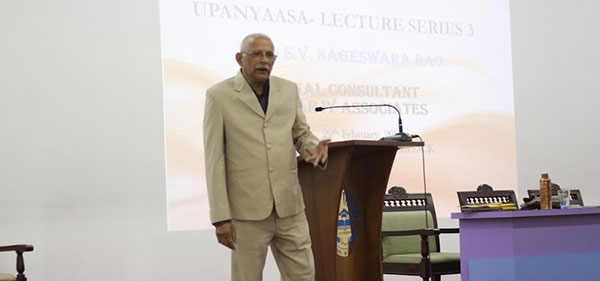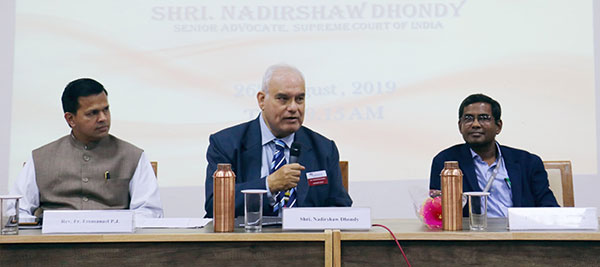
Upanyaasa Lecture Series
Property Law in India-Problems and Perspectives
Classes Attended: B.A. LL.B., B.Com LL.B., and BBA. LL.B. (all batches)
Name and Details of the Resource Person: Sri S.V.Nageswara Rao Legal Consultant, Beneajy
Associates, Bengaluru.
Objective: Property Law in India-Problems and Perspectives
Sir started the lecture by giving a brief introduction about Transfer of Property Act, 1882 which is a codified Act and mainly deals with the transfers of property in the form of selling, purchasing, mortgaging, gifts, lease, exchange etc. Sir explained the definition of buyer, seller, and type of property which is dealt in the Act and also familiarized us with several other concepts of the Act.
Sir talked about the salient features of the Act such as
• That the transaction should be inter vivos, that is, between 2 living persons
• Transaction should be voluntary
• It is not retrospective in nature
Sri S.V.Nageswara Rao gave a brief about various sections of the Act such as Sec 5 which deals what type of property can be transferred. Sec 6 which tell about which property cannot be transferred which is further divided into various 8 parts. Sec 41 which deals with benami transactions and ostensible ownership under Sec 53A which talks about part performance. Later sir explained Sec 6 in detail which talks about Spes Succession which means just the chances of succeeding a property and such property cannot be transferred. Sir also discussed about the details in matter of mortgage where sec 58 gives the definition of mortgage and following sections talk about the other details.
At the end of the session, Sir elaborated practically what all taught using legal documents and also showed us examples of how sales and registration are done under the provisions of the Act.
It was a great learning experience for all the students.

Upanyaasa Lecture Series- 8
Kristu Jayanti College of Law conducted the Online Webinar Upanyaasa Lecture Series 8 on the topic Vicarious Liability in the contemporary legal system and the resource person for the same was Dr. Subramanya Gowdappanavar, Associate Professor at K.L.E College of Law, Bengaluru on 19th June 2020. Sir introduced the topic by clearly explaining what the topic means and further provided comprehensive information on the subject. A brief insight on the same goes as follows:
Vicarious liability is a doctrine that inflicts the responsibility of one person for the other especially in terms of the failure of the later. The relationship particularly specifies the employer and employee. Thus an employer would be vicariously liable for an employee’s tort if there was a close connection with the employment. This liability can be mainly applied to relationships held between principal and agent, the liability of partners for each other’s torts, and liability of a master for the tort of his servant.
An employer will only be liable for the torts of their employees if they are committed during the course of employment rather than, as the courts put it, ‘on a frolic of his own’. This is another area of vicarious liability that the courts have found particularly difficult to agree on. Thus there are two essential things required for the liability of the master towards the servant to arise; it is that the tort must be committed by the servant and it must be in the due course of his employment.
However there are certain cases precisely described by Dr. Subramanya Gowdappanavar where an employee is not working under the scope of an employment, hence Vicarious Liability may not be applicable in such circumstances:
1. Independent Contractors: People who perform work for another under an agreement or contract; they are not considered as employees but as independent contractors. Thus the employers of independent contractors shall not be liable under vicarious liability.
2. Illegal Acts: Any damages caused due to illegal acts cannot be considered under Vicarious Liability.
Furthermore, Dr. Subramanya Gowdappanavar also provided deep insights on vicarious liability in terms of a firm and its partners, company and directors, workers and their independent contractors, guardian and ward, etc. thus covering all perspectives. He also dealt with some very important case laws that provided detailed knowledge on Vicarious Liability under the law of torts.
This session was extremely beneficial to all the participants. The lecture was followed by a Q & A session where Sir responded to all questions that were put up by the students. It was a great experience to have such an informative session and gain more knowledge from an expert of his field given the circumstances that we are in.
Upanyaasa Lecture Series- 9
Kristu Jayanti College of Law conducted its 9th as a part of the Upanyaasa Lecture Series on 29th June 2020. Dr. Syed Mohid Altaf, Principal and Director of N.A. Global Law School, Bengaluru was the resource person for this session. He gave our audience/participants an overview of Muslim law. Sir spoke about divorced of Muslim law. He discussed about the new triple talaq law and expressed his view on the new law, Wasiyat etc. He spoke about the twofold restrictions to dispose the property by will and also mentioned about the inheritance. Sir also discussed about the difference ways in which a will could be revolved.
Sir further discussed about adoption and guardianship. He clearly explained the provisions about adoption and guardianship under Muslim Law and differentiated it with the personal laws of other religion. Sir also explained that the Muslim personal law does not recognize adoption and if a Muslim has a desire to adopt, he can do so under the Guardians and Wards Act, 1890. Sir also explained the difference between the custody of a child and guardianship of a minor person. Finally, sir spoke about Waqf one of the most important branch of Mohammedan Law. Sir explained the different aspects of Waqf with the help of some important judgements. The lecture series was followed by a Q & A session where Sir responded to all the questions that were put forth by the participants.
Upanyaasa Lecture Series - Relevance of Doctrines under the Transfer of Property Act
Kristu Jayanti College of Law conducted the Online Webinar Upanyaasa Lecture Series 7 on the topic Relevance of Doctrines under the Transfer of Property Act and the resource person for the same was Prof. K. Shivaprasad, Associate Professor, Vivekananda College of Law, Bengaluru. The webinar started at 2.50 pm, where more than hundred and seventy participants joined including students, practitioners, academicians and other eminent personalities from all around the country.
Prof.K.Shivaprasad started his lecture stating the relevance of studying the Transfer of Property Act and he began with a brief introduction of the term Immovable property. Sir highlighted the relevant points about various types of doctrines and principles in the Act. Few of the important points Sir included in his lecture was Section 43 of Transfer of Property regarding the grant by estoppel. While explaining this he said that the transferor might have honestly believed in the truth of the representation that he was authorized to transfer the property which he professed to transfer, but that would not render the section inapplicable. Section 35 of Transfer of Property Act, 1882 incorporates the Doctrine of election. Election means choosing between two inconsistent or alternative rights.
This Doctrine of election is about Equity. Equity is applied to every species of instrument whether deed or will and to every kind of property movable or Immovable.
Prof. Shivaprasad even explained about the Doctrine of part performance. This principle is based on the principle of equity, which was developed in England.
Section 53(A) says that if a person makes an agreement with another and lets the other person act on the behalf of the contract, such a person creates an equity himself that cannot be resisted on the mere grounds of absence of formality in the evidence or contract of such a transfer.
After the completion of the lecture the session was opened for the participants to clarify their doubts and ask queries pertinent to the lecture delivered. It was a fruitful session as all the participants benefitted from the same.
Upanyaasa Lecture Series - Winding Up of the Companies
Classes Attended: B.A. LL.B., B. Com LL.B., and BBA. LL.B. (All batches of Kristu Jayanti College of Law, Academicians and Advocates)
Name and Details of the Resource Person: Mr. Sajal Sharma, Assistant Professor, University of Petroleum and Energy Studies, Dehradun.
Topic: Winding Up of the Companies
The session completely dealt with the legal provisions that govern the Winding up of Companies. The resource person, Mr. Sajal explained about what is winding up of Companies in light of the provisions of the Companies Act 2013. He explained that the main objectives behind the winding up of a company are primarily to realise the assets and then to repay the debtors. Sir explained about the differences between some very important concepts under the Company Law such as winding up and dissolution, winding up and insolvency he also went on to explaining the relationship between an individual and a company. Mr. Sajal gave few examples including the Jet airways case in order to explain the relevance of the provisons regarding winding up of companies. Sir explained about Compulsory winding up of companies and the grounds of the same which includes special resolution, any conduct of the company against the sovereignty, any conduct which is fraudulent/unlawful, default in filing the statements/annual returns with the Registrar of Companies and just and equitable grounds. All of these provisions were discussed in much detail. Sir further explained about who all can file a petition, and that includes the company itself, the contributors, the Registrar or any person authorised by central government and Central/State government. Sir dealt how the commencement of winding up takes place and the procedure of winding up which includes the filing of a petition after which a provisional liquidator is appointed who assess the grounds for the same. It is then followed by the removal and replacement of the liquidator who further proceeds with the process of winding up of committee and the tribunal. All of these provisions were explained in detail with the help of cases and relevant provisions. In addition to these topics several other topics such as the consequences of winding up order, duties and powers of liquidator were also discussed in the session.
The whole session was very informative, enriching and enlightening. The detailed nature of the discussion on the various provisions and authorities that are involved in the winding up of the company helped all the participants in gaining complete idea about this topic.
SIGNIFICANCE OF LEGAL PROFESSION AND ETIQUETTE
Date: 26th August 2019
Time: 9.00 A.M. to 11.00 A.M.
Classes attended: students and all the Faculties in Law.
Number of beneficiaries: 300
Name and details of the Resource Person: Sri Nadir Shah Dhondy, Supreme Court Advocate
Objectives: imparting knowledge about the significance of legal profession and etiquette
Sir began his lecture by explaining that the professional ethics is the fundamental prerequisite of any profession. Ethics refers to human behavior to make decisions between what is correct and what is wrong. Professional ethics are those set code or moral principles that govern a person's conduct in a professional workplace or work life. In the legal profession, a lawyer must obey to professional codes for fair dealing with the client and uphold the self-possession. The Indian government has established a statutory body known as The Bar council of India under the Advocate Act,1961, Bar Council Of India Rules, etc. he also explained in detail the even lamps of advocacy, lawyers duty towards clients, opponents, colleagues etc.
The lecture was followed by an interactive session with students as well as faculty members. Students were overwhelmed to gain the knowledge of law.

Departmental Activities
goto QuickLinks
ABOUT
ACADEMICS
RESEARCH
CAMPUS
Explore 360° View